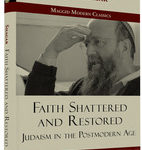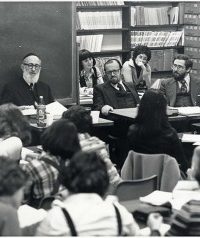Can God create a rock so heavy that even He cannot lift it? Theologians have been debating this question, known formally as the “omnipotence paradox,” since at least the middle ages. In a sense, the premise behind it is nonsensical: to suggest that something unlimited might actually be limited by the fact that it cannot have any limits is semantically clever, but it is practically meaningless. Thus intimated the great Catholic thinker Thomas Aquinas when he reflected, in his Summa Theologica, that “some things are not subject to [divine] power, because they fall short of being possible [altogether].”[i] Averroes, a prominent Muslim philosopher, echoed these sentiments in his Incoherence of the Incoherence by claiming that “even the omnipotent cannot bring it about that existence should become identical with nonexistence.”[ii] So no, these men would insist, God cannot create a rock that He cannot lift. To suggest otherwise is illogical.
Nowhere does our Tanakh directly discuss the dilemma of omnipotence. We do, however, find a passing reference to one of God’s “inabilities,” in a well-known passage in the book of Bamidbar. After the sin of the spies, the Israelites criticize God for “bring[ing] us to this land to fall by the sword.”[iii] They decide that they no longer wish to settle the land of Canaan and agitate to “appoint a [new] leader and return to Egypt!”[iv] God, for His part, threatens to destroy the people and to recreate the nation from Moshe’s progeny. But Moshe is not interested in this offer. He replies:
If You kill this nation like one man, the nations who have heard of Your reputation will say as follows: ‘Since the Lord lacked the ability to bring this nation to the land which He swore to them, He slaughtered them in the desert’ (Numbers 14:15-6).
Ultimately, Moshe succeeds: God relents and the people are saved.
The dynamic of “power” that animates this exchange is interesting to us on at least three levels. Firstly, Moshe dares to debate God—not an unusual move for Biblical personalities, but a radical one nonetheless. Secondly, he actually wins the debate. And thirdly—and most relevant for our purposes—Moshe’s argument seems, at least at first glance, to turn on the most juvenile of considerations. We almost sense that God spared the Israelites simply so that He could continue splitting seas and stopping suns on their behalf—lest anybody entertain the thought that He had somehow lost that power.
But what is power, really? Twice during his exchange with God does Moshe use this word (כח, in Hebrew) in order to advance his case. At the beginning of his plea, Moshe declares that “You have brought this nation out of Egypt with great power” (14:13). Prime facie, “power” here means the ability to do something—or, as political scientist Robert Dahl memorably put it, “getting B to do something that B would not otherwise do.”[v]
Yet sometimes we need to exercise power in order not to do something. It is this second definition of power which Moshe adopts in his closing remarks:
Now please, let the power (כח) of the Lord be made greater (ג.ד.ל), as you spoke, saying: The Lord is slow to anger and abundantly kind, forgiving iniquity and transgression… Please forgive the iniquity of this nation in accordance with your great (ג.ד.ל) kindness, as You have borne this people from Egypt until now (14:17-19).
Following the sin of the Golden Calf, God taught Moshe His “thirteen attributes of mercy.” Those are precisely the attributes which Moshe quotes in our passage. Whereas God had promised to make a “great” (ג.ד.ל) nation out of Moshe (14:12), Moshe insinuates that it is through God’s “great (ג.ד.ל.) kindness” that the “greatness” of His “power” is truly manifest. Those who really possess power do not exercise it through their petulance but through their patience, Moshe hints. It takes more power to forgive than it does to exact revenge.
Perhaps this idea is even truer of God than it is of humans. In In His Mercy, a short monograph on the “thirteen attributes,” R. Ezra Bick presents his readers with a startling observation to this effect. He begins by discussing the notion of sin:
Sin is by definition something that opposes the divine will. Therefore, we may logically assert that God’s will [to sustain] existence does not include that which runs in opposition to His will. The very first sin already brings an end to the [process of God granting us continued existence]. Sin, by definition—and this is the critical point—runs in opposition to the divine will and thus contradicts the reality of existence. The very fact that existence stems from [God], and that He brings all worlds into existence…necessitates that a world with sin cannot continue to exist. Regardless of how exactly we define God’s objectives in creating the world—a subject that has of course been subject to fierce debate among thinkers throughout the generations—sin is clearly not among them. A world that is in opposition to God’s will cannot exist by His will; this is inherently self-contradictory.[vi]
Taken to its logical extreme, R. Bick’s point implies that one who sins should immediately cease to exist. And yet, despite all of our shortcomings, we continue to live. How can this be? Here is the explanation that R. Moshe Cordovero (“Ramak”) presents in his own treatise on the “thirteen attributes,” entitled Tomer Devorah:
No man ever sinned against G-d without G-d Himself bestowing that man’s existence and the ability to move his limbs, at that very moment. Even though a person uses this very power to transgress, God does not withhold it from him at all. Rather, the Holy One, Blessed is He, tolerates this insult and continues to bestow on him the power to move his limbs. Even at the very moment that a person uses God’s power for transgression, sin and infuriating deeds, the Holy One, Blessed is He, continues to grant it to him![vii]
Ramak’s insight is remarkable: in order to forgive others, God has to negate Himself. This concept is known in Kabbalistic thought as tsimtsum, or “divine contraction.” It states that just as we must make space for God in our lives, so too must He make space for us in His. Unless God is big enough to make Himself small, He cannot enter into a relationship with man.
That may be what Moshe is referring to in our passage. Had God “slaughtered the Israelites” after they sinned, then the “nations of the world” would have been correct to conclude that “He lacked the ability to bring them into the land which He had promised them.” A God who cannot tolerate human mistakes is quite literally incapable of coexisting with humanity. Moshe understands how power works. He knows that if God cannot “contract”—that is, control—Himself, as it were, then His ability to wield influence over His subjects will be severely limited as a result.
It is no accident that the Torah chooses to communicate this idea through a debate in which Moshe defeats God, as it were. The medium fits the message perfectly. That message, in a word, is that even absolute power must recognize limits. By submitting to this principle, God “gives in” to Moshe on two levels simultaneously: not only does He back down from the immediate threat to the Jewish nation, He also acknowledges the validity of Moshe’s theological challenge. The result is that both sides “win” in the end. Not through force but through forbearance does God demonstrate His greatness. That, too, is a paradox of power. Aquinas and Averroes conceived of the paradox in metaphysical terms; Moshe teaches us to consider its moral dimension as well.
Nor is this principle limited to the realm of bein adam le-makom. Like God, we must resist the urge to constantly assert ourselves if we are to leave room for others to enter into our lives. Real strength is not imposing, but inviting. In the words of our sages: “Who is powerful? He who conquers his own nature.”[viii]
[i] Aquinas, Thomas. Summa Theologica, Q. 25 Art. 4, cited in Anton Pegis (ed.), Basic Writings of St. Thomas Aquinas, Vol. 1, p. 266. Indianapolis, IN: Hacket Publishing Company, 1997.
[ii] Averroes. Incoherence of the Incoherence, Second Discussion. Translated by Simon Van Den Bergh. Available at: www.muslimphilosophy.com.
[iii] Num. 14:3. All translations from the Judaica Press, available at: www.chabad.org.
[iv] Num. 14:4.
[v] Dahl, Robert. “The Concept of Power.” Behavioral Science, 2:3 (1957:July) p.201
[vi] Bick, Ezra. In His Mercy: Understanding the Thirteen Midot. Jerusalem, Israel: Maggid Books, 2011. Available at: www.etzion.org.il.
[vii] Cordovero, Moshe. Tomer Devorah. Available at: http://www.israel613.com/.
[viii] Avot 4:1.
Please leave comments below or email responses to [email protected]. Select responses will be published in future issues.







What is Divine “Power?”
Can God create a rock so heavy that even He cannot lift it? Theologians have been debating this question, known formally as the “omnipotence paradox,” since at least the middle ages. In a sense, the premise behind it is nonsensical: to suggest that something unlimited might actually be limited by the fact that it cannot have any limits is semantically clever, but it is practically meaningless. Thus intimated the great Catholic thinker Thomas Aquinas when he reflected, in his Summa Theologica, that “some things are not subject to [divine] power, because they fall short of being possible [altogether].”[i] Averroes, a prominent Muslim philosopher, echoed these sentiments in his Incoherence of the Incoherence by claiming that “even the omnipotent cannot bring it about that existence should become identical with nonexistence.”[ii] So no, these men would insist, God cannot create a rock that He cannot lift. To suggest otherwise is illogical.
Nowhere does our Tanakh directly discuss the dilemma of omnipotence. We do, however, find a passing reference to one of God’s “inabilities,” in a well-known passage in the book of Bamidbar. After the sin of the spies, the Israelites criticize God for “bring[ing] us to this land to fall by the sword.”[iii] They decide that they no longer wish to settle the land of Canaan and agitate to “appoint a [new] leader and return to Egypt!”[iv] God, for His part, threatens to destroy the people and to recreate the nation from Moshe’s progeny. But Moshe is not interested in this offer. He replies:
If You kill this nation like one man, the nations who have heard of Your reputation will say as follows: ‘Since the Lord lacked the ability to bring this nation to the land which He swore to them, He slaughtered them in the desert’ (Numbers 14:15-6).
Ultimately, Moshe succeeds: God relents and the people are saved.
The dynamic of “power” that animates this exchange is interesting to us on at least three levels. Firstly, Moshe dares to debate God—not an unusual move for Biblical personalities, but a radical one nonetheless. Secondly, he actually wins the debate. And thirdly—and most relevant for our purposes—Moshe’s argument seems, at least at first glance, to turn on the most juvenile of considerations. We almost sense that God spared the Israelites simply so that He could continue splitting seas and stopping suns on their behalf—lest anybody entertain the thought that He had somehow lost that power.
But what is power, really? Twice during his exchange with God does Moshe use this word (כח, in Hebrew) in order to advance his case. At the beginning of his plea, Moshe declares that “You have brought this nation out of Egypt with great power” (14:13). Prime facie, “power” here means the ability to do something—or, as political scientist Robert Dahl memorably put it, “getting B to do something that B would not otherwise do.”[v]
Yet sometimes we need to exercise power in order not to do something. It is this second definition of power which Moshe adopts in his closing remarks:
Now please, let the power (כח) of the Lord be made greater (ג.ד.ל), as you spoke, saying: The Lord is slow to anger and abundantly kind, forgiving iniquity and transgression… Please forgive the iniquity of this nation in accordance with your great (ג.ד.ל) kindness, as You have borne this people from Egypt until now (14:17-19).
Following the sin of the Golden Calf, God taught Moshe His “thirteen attributes of mercy.” Those are precisely the attributes which Moshe quotes in our passage. Whereas God had promised to make a “great” (ג.ד.ל) nation out of Moshe (14:12), Moshe insinuates that it is through God’s “great (ג.ד.ל.) kindness” that the “greatness” of His “power” is truly manifest. Those who really possess power do not exercise it through their petulance but through their patience, Moshe hints. It takes more power to forgive than it does to exact revenge.
Perhaps this idea is even truer of God than it is of humans. In In His Mercy, a short monograph on the “thirteen attributes,” R. Ezra Bick presents his readers with a startling observation to this effect. He begins by discussing the notion of sin:
Sin is by definition something that opposes the divine will. Therefore, we may logically assert that God’s will [to sustain] existence does not include that which runs in opposition to His will. The very first sin already brings an end to the [process of God granting us continued existence]. Sin, by definition—and this is the critical point—runs in opposition to the divine will and thus contradicts the reality of existence. The very fact that existence stems from [God], and that He brings all worlds into existence…necessitates that a world with sin cannot continue to exist. Regardless of how exactly we define God’s objectives in creating the world—a subject that has of course been subject to fierce debate among thinkers throughout the generations—sin is clearly not among them. A world that is in opposition to God’s will cannot exist by His will; this is inherently self-contradictory.[vi]
Taken to its logical extreme, R. Bick’s point implies that one who sins should immediately cease to exist. And yet, despite all of our shortcomings, we continue to live. How can this be? Here is the explanation that R. Moshe Cordovero (“Ramak”) presents in his own treatise on the “thirteen attributes,” entitled Tomer Devorah:
No man ever sinned against G-d without G-d Himself bestowing that man’s existence and the ability to move his limbs, at that very moment. Even though a person uses this very power to transgress, God does not withhold it from him at all. Rather, the Holy One, Blessed is He, tolerates this insult and continues to bestow on him the power to move his limbs. Even at the very moment that a person uses God’s power for transgression, sin and infuriating deeds, the Holy One, Blessed is He, continues to grant it to him![vii]
Ramak’s insight is remarkable: in order to forgive others, God has to negate Himself. This concept is known in Kabbalistic thought as tsimtsum, or “divine contraction.” It states that just as we must make space for God in our lives, so too must He make space for us in His. Unless God is big enough to make Himself small, He cannot enter into a relationship with man.
That may be what Moshe is referring to in our passage. Had God “slaughtered the Israelites” after they sinned, then the “nations of the world” would have been correct to conclude that “He lacked the ability to bring them into the land which He had promised them.” A God who cannot tolerate human mistakes is quite literally incapable of coexisting with humanity. Moshe understands how power works. He knows that if God cannot “contract”—that is, control—Himself, as it were, then His ability to wield influence over His subjects will be severely limited as a result.
It is no accident that the Torah chooses to communicate this idea through a debate in which Moshe defeats God, as it were. The medium fits the message perfectly. That message, in a word, is that even absolute power must recognize limits. By submitting to this principle, God “gives in” to Moshe on two levels simultaneously: not only does He back down from the immediate threat to the Jewish nation, He also acknowledges the validity of Moshe’s theological challenge. The result is that both sides “win” in the end. Not through force but through forbearance does God demonstrate His greatness. That, too, is a paradox of power. Aquinas and Averroes conceived of the paradox in metaphysical terms; Moshe teaches us to consider its moral dimension as well.
Nor is this principle limited to the realm of bein adam le-makom. Like God, we must resist the urge to constantly assert ourselves if we are to leave room for others to enter into our lives. Real strength is not imposing, but inviting. In the words of our sages: “Who is powerful? He who conquers his own nature.”[viii]
[i] Aquinas, Thomas. Summa Theologica, Q. 25 Art. 4, cited in Anton Pegis (ed.), Basic Writings of St. Thomas Aquinas, Vol. 1, p. 266. Indianapolis, IN: Hacket Publishing Company, 1997.
[ii] Averroes. Incoherence of the Incoherence, Second Discussion. Translated by Simon Van Den Bergh. Available at: www.muslimphilosophy.com.
[iii] Num. 14:3. All translations from the Judaica Press, available at: www.chabad.org.
[iv] Num. 14:4.
[v] Dahl, Robert. “The Concept of Power.” Behavioral Science, 2:3 (1957:July) p.201
[vi] Bick, Ezra. In His Mercy: Understanding the Thirteen Midot. Jerusalem, Israel: Maggid Books, 2011. Available at: www.etzion.org.il.
[vii] Cordovero, Moshe. Tomer Devorah. Available at: http://www.israel613.com/.
[viii] Avot 4:1.
Please leave comments below or email responses to [email protected]. Select responses will be published in future issues.